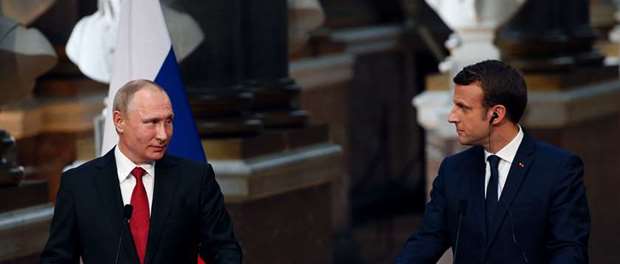In one of the sharper moments of a news conference marking a visit by Putin, Macron added that he had already raised the issue with the Kremlin leader in a post-election phone call, going on to say that the episode was in the past and would stay there.
“When I say things once, I don’t usually repeat myself,” he said.
During the fraught election campaign, Macron’s camp banned two Russian news outlets – state-funded Sputnik news agency and RT TV channel – from having media access to his campaign headquarters, saying that they were spreading propaganda rather than reporting real news.
With Putin alongside him, the 39-year-old Macron repeated the accusation in a reply to a journalist’s question, saying: “During the campaign, Russia Today and Sputnik were agents of influence which on several occasions spread fake news about me personally and my campaign.”
“They behaved like organs of influence, of propaganda and of lying propaganda,” he said.
During the campaign, which climaxed with Macron’s election on May 7, Macron’s camp also irritated the Kremlin by saying its campaign’s networks, databases and sites had come under attack from locations inside Russia.
When his camp barred journalists from the two Russian outlets from Macron’s headquarters, a Russian foreign ministry spokeswoman denounced the move as “outrageous ... bare-faced discrimination”.
The Kremlin and RT itself have rejected allegations of meddling in the election.
Putin did not react to Macron’s comments about the Russian media, although he bristled when a journalist suggested that Moscow’s hand was behind cyber attacks on the Macron campaign.
These hacking allegations, he said, were not based on facts.
“Maybe they were Russian hackers, maybe they were not,” he said.
The Kremlin appeared to favour Macron’s far-right opponent Marine Le Pen for the presidency during the campaign and Putin offered her a publicity coup when he granted her an audience a month before the election’s first round.
Putin, though, said yesterday that his meeting with Le Pen did not mean he was trying to influence the outcome of election.
He said that he saw nothing wrong with Moscow agreeing to meet foreign politicians who sought good relations with Russia.
The first meeting between Macron and Putin since the former took office provided another test of the Frenchman’s diplomatic skills after his memorable first encounter last week with US President Donald Trump that Macron sealed with a vice-like handshake.
This time the handshake was warmer but the tone guarded after an hour of talks.
Putin admitted to some differences of opinion in the talks which covered issues including the conflicts in Syria and Ukraine, but insisted that Franco-Russian ties withstood “all points of friction”.
“We disagree on a number of things but at least we discussed them,” Macron said.
“Our absolute priority is the fight against terrorism and the eradication of terrorist groups and Daesh in particular,” he said, using an alternate name for the Islamic State (IS) group that has claimed several deadly attacks in France.
The newly elected French leader called for a stronger partnership with Russia on Syria, one of the sticking points in relations between the West and Moscow which backs the regime of President Bashar al-Assad.
Macron advocated “a democratic transition that preserves the Syrian state”, warning that “failed states” in the Middle East were a threat to the West.
But in an apparent warning to Assad and Russia, he said the use of chemical weapons in Syria would be a “red line” for his presidency and would draw an “immediate response” from France.
The pair discussed the Western sanctions imposed on Russia over its military involvement in Ukraine as well as allegations of Russian meddling in France’s election campaign.
The Russian president declared that the sanctions were “in no way” helping to end the fighting between government forces and Kremlin-backed rebels in Ukraine’s east.
Ahead of the visit by Putin, Macron told a French weekly that he was not “bothered” by leaders who “think in terms of power dynamics”.
He said he would make “not a single concession” to Russia on the long-running conflict in Ukraine, with he and his G7 counterparts saying they were prepared to strengthen sanctions against Moscow.
Since the start of the war in Ukraine in 2014, Russia has flexed its muscles with a series of war games involving tens of thousands of troops in areas bordering Nato Baltic states.
Macron said he, Putin and the leaders of Germany and Ukraine would meet soon for talks, “which will allow us to make a complete evaluation of the situation”.
Western powers charge Russia with failing to honour its commitments under the Minsk accords framework for ending the violence in Ukraine.
France helped spearhead the sanctions, which have seriously dented EU-Russia trade.
Putin moved quickly after the French election to try to smooth things over, congratulating Macron and urging him to work to overcome their countries’ “mutual distrust”.
Yesterday’s visit comes seven months after Putin cancelled a trip to Paris amid a row over Syria with Macron’s predecessor Francois Hollande, who had said Russia’s bombing of Aleppo could amount to war crimes.
In Versailles, he and Macron inaugurated an exhibition marking the visit of Russia’s modernising tsar Peter the Great to France in 1717.
The fervently pro-Europe Macron said his invitation to Putin aimed to showcase “a Russia which is open to Europe”.
Putin was also later to visit a new Orthodox cathedral complex in central Paris.

